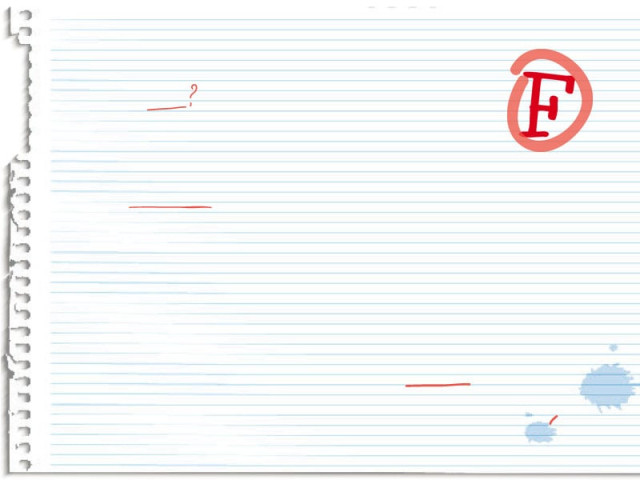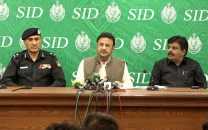English-vinglish: Those who can, do, those who can’t, write textbooks
Punjab govt schools’ English textbook for fourth graders full of grammatical, spelling mistakes.

Punjab govt schools’ English textbook for fourth graders full of grammatical, spelling mistakes. ILLUSTRATION: SAMRA AAMIR
The English textbook prepared by the education department for students of fourth grade is full of mistakes and grammatical errors, some comical, others ridiculous.
After noticing some of the glaring errors in the book, it appears that the textbook board felt no need to have someone proofread it. Millions of copies have already been published and distributed among students in Punjab.
Right grammar, wrong language
The most glaring mistakes seem to be the result of poor Urdu-to-English translations. On page 134, there is a sentence which reads, “The old man is riding her bike.”

If Urdu grammar rules were applied, this sentence would be correct. However, in English, this sentence creates confusion over the gender identity of the old man.
There are also numerous sentences missing definite articles. Page 99 has a sentence which reads “Milk was too hot”. The sentence should begin with ‘the’. This mistake also occurs on page 46 in a question asking students to “Write a paragraph on ‘My Friend’ with the help of given mind map”. Given should be preceded by ‘the’.
This mistake may be due to the fact that ‘the’ has no equivalent word in Urdu. The error also extends to parts of the book which are not required reading for students.
The book’s cover states “This textbook has been selected and distributed by Government of Punjab for Academic year 2014-2015 as sole textbook for all Government Schools in Punjab,” which is completely devoid of the word ‘the’, although it should have been placed before “Government of Punjab”, “academic” and “sole”. The sentence also features improper capitalisation of “academic” and “government schools”, the former being a common term and the latter a common noun.

An obvious proofing mistake occurs on page 49, where the word ‘shopkeeper’ has been spelt properly in the first line, and then improperly as two words in the very next line.
On the same page, “ice-cream” is spelt with a hyphen. This is also incorrect.
In 2007, the Shorter Oxford English Dictionary eliminated 16,000 hyphens from its sixth edition. Ice cream was one of the words. At the same time, ice-cream cone would still require a hyphen as adjectival compounds comprising an adjective or a participle followed by a noun are still always hyphenated.
Out of many, one
The book also contains several spelling mistakes. One such example is a sentence on page 76 which says, “Plants give us fruit….Plants give us vegetable.”
The word should be “vegetables” as the other nouns in the sentence including the non-count noun fruit are in their plural forms.
Neuter gender is defined in the book as “nouns that name non-living things”, with the examples given being flowers, bird and seasons.
The first two are living things which are assigned genders in most cases.
In fact, neuter gender words are simply nouns or pronouns for things that have no gender, such as seasons, cars, doors or colours.
The contract for publishing the book was given to Apple Educational Press in January 2014 and 126,000 copies were published in that month.
Wasted minds, wasted money
“It is negatively affecting our children’s minds. We are teaching them trash. It’s a national error that needs correction as soon as possible,” said Muhammad Alam, a senior teacher.
He said there are several committees that approve a textbook after several reviews and proofing before the books are ready to publish. “Millions of rupees are spent on textbooks. I don’t understand how such major blunders went unnoticed,” he commented.
Another teacher, Muhammad Sagheer Gujjar, told The Express Tribune that there are dozens of factual mistakes in other textbooks as well. “This is why most students fail in English,” he said, adding that millions of copies of the book have been distributed among students, which means “not only are we teaching our students the language incorrectly, but we are also wasting millions in public funds”.
Glass houses
Unfortunately, the problem is not just with the textbooks. While many primary schools teachers were quick to condemn the mistakes in the book, there was an eerie silence when they were asked why they did not notice or bring up the mistakes in the first place.
Published in The Express Tribune, May 4th, 2014.



















COMMENTS
Comments are moderated and generally will be posted if they are on-topic and not abusive.
For more information, please see our Comments FAQ